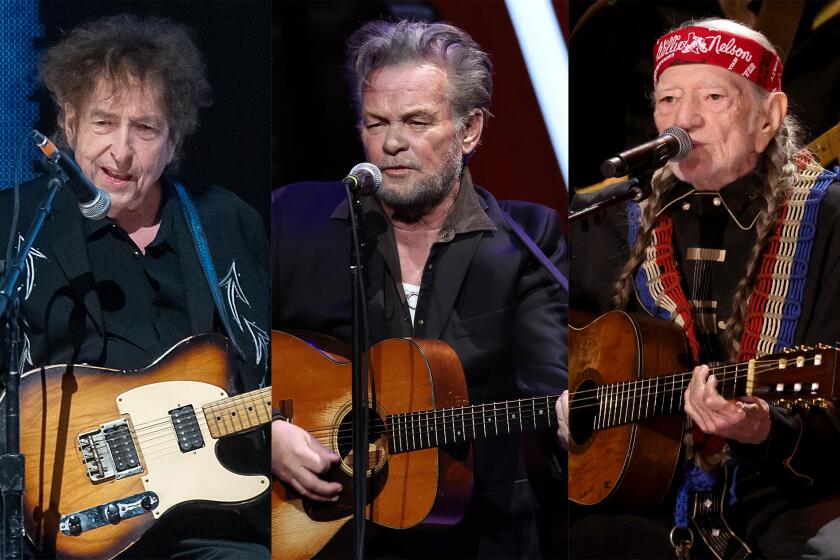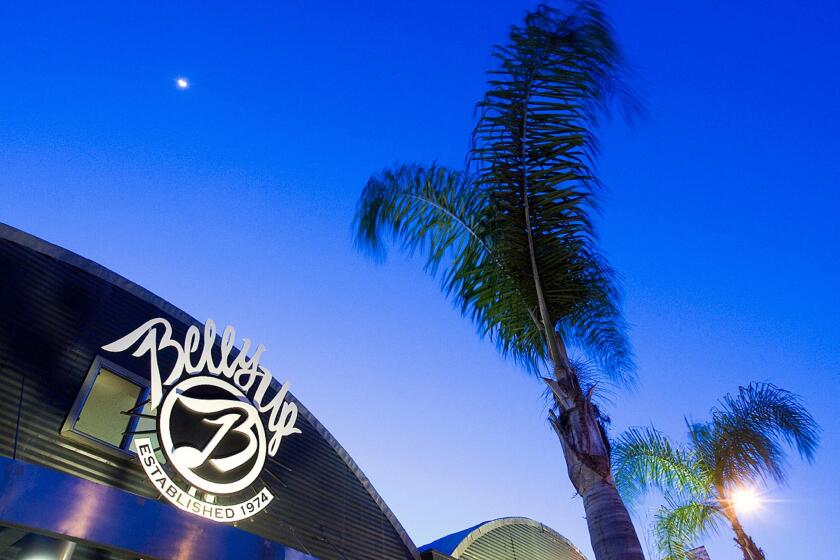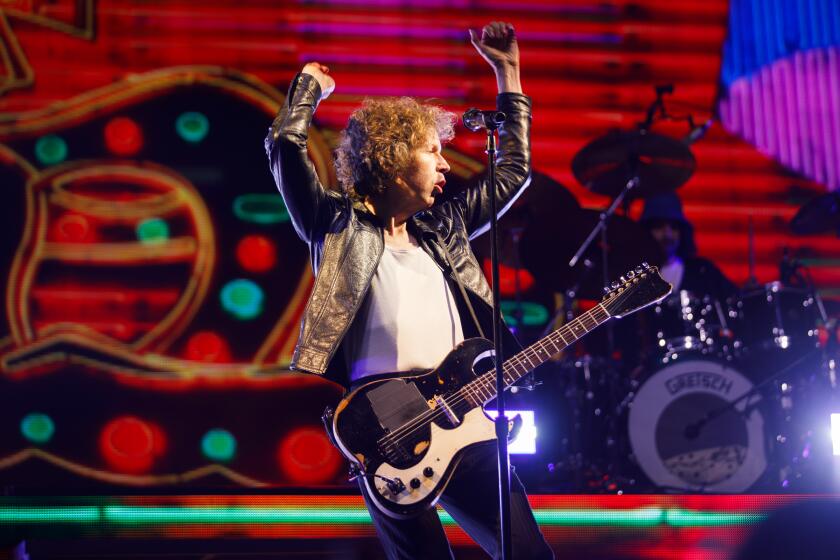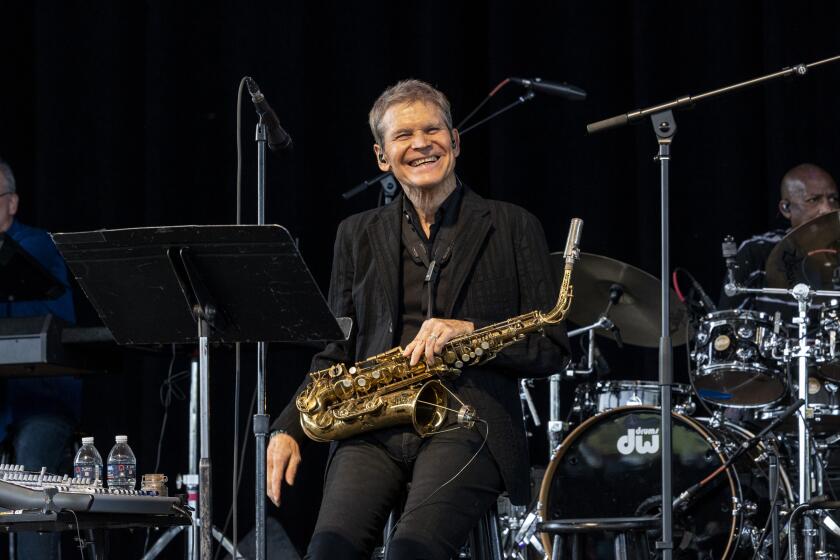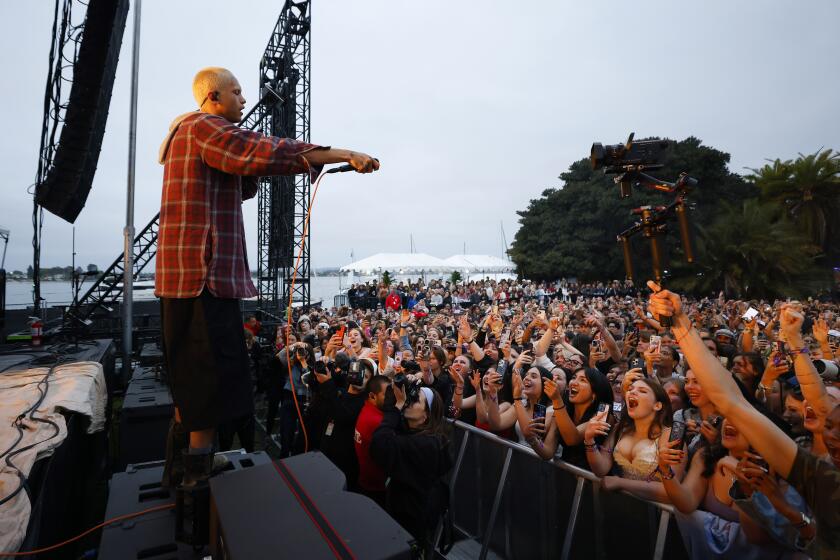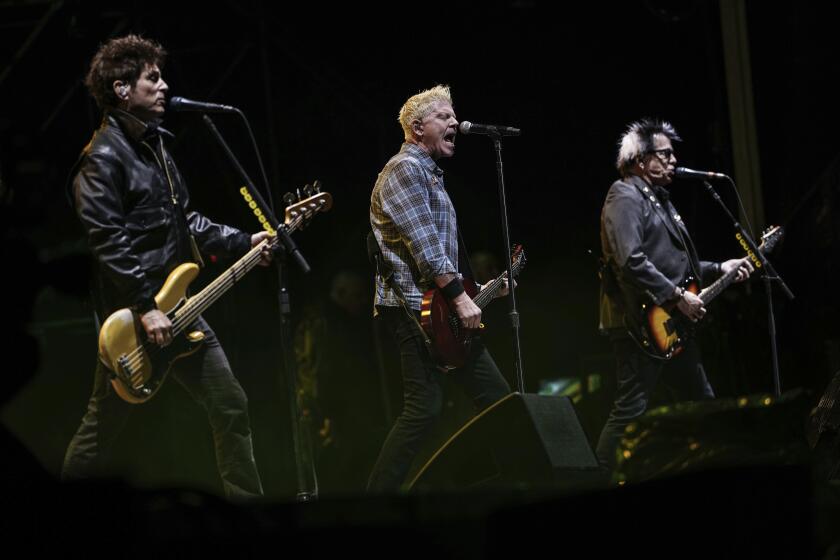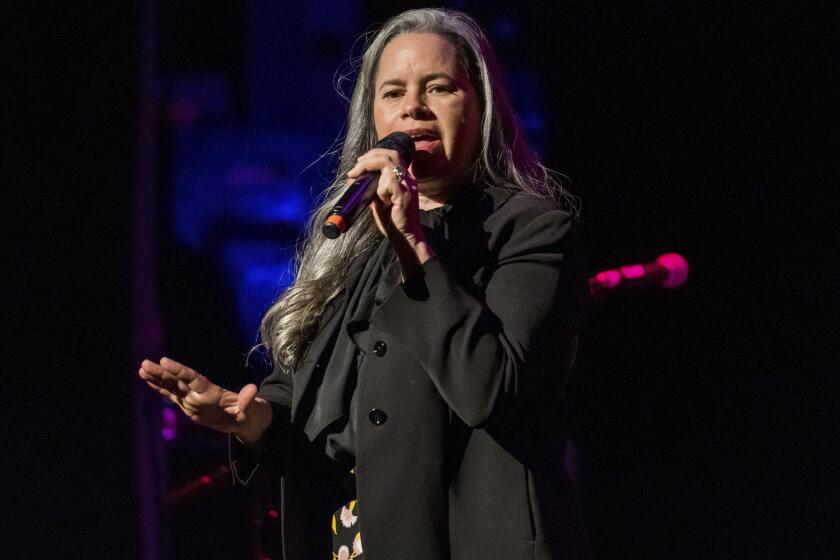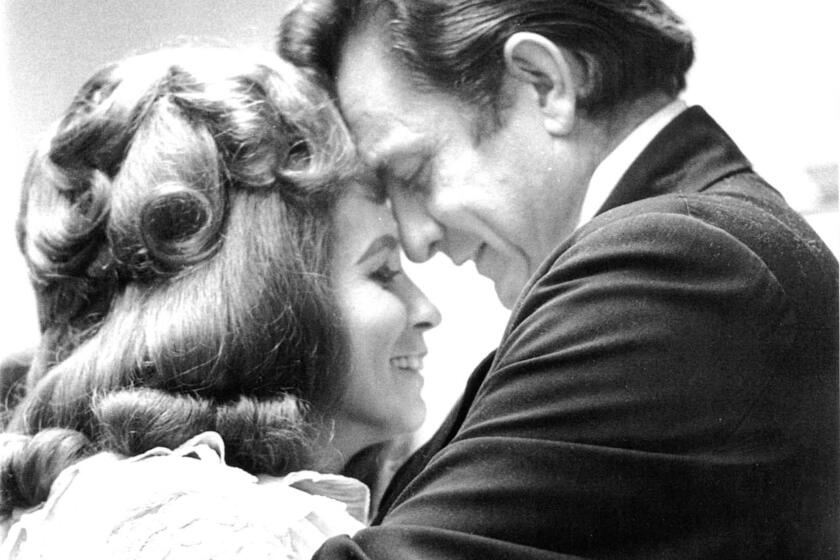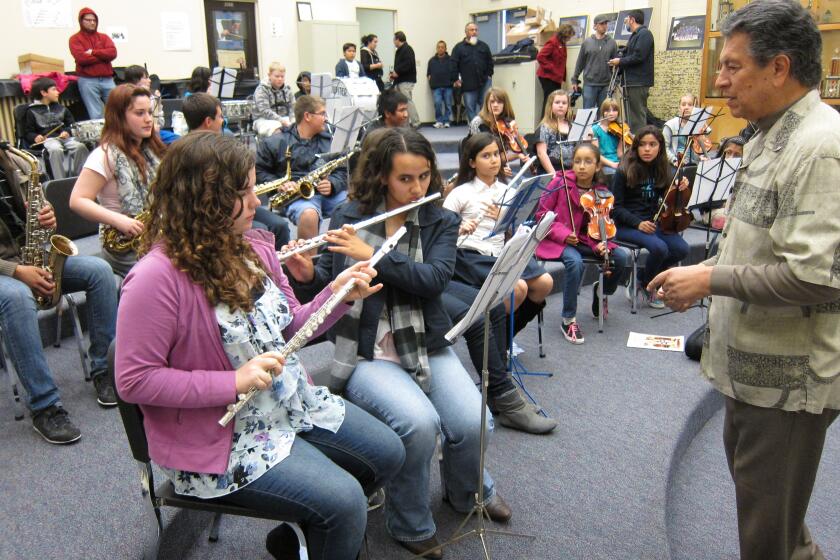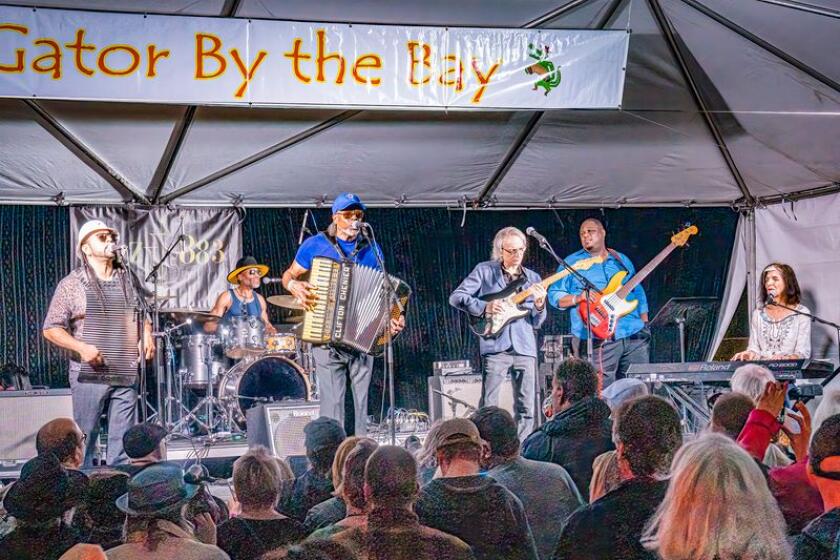Gregory Porter rises up on stirring new album: ‘We need things to elevate us’
Music transformed the Grammy-winning vocal star after an injury abruptly ended his college football career at San Diego State University
The uplifting power of love to overcome even the most wrenching adversity fuels the music of Grammy Award-winning vocal star Gregory Porter, whose deeply felt songs blur the lines between jazz, gospel, pop, funk and R&B.
The desire and ability to uplift is most inspired by his mother, Ruth — a tireless minister, nurse and real-estate agent — who made it her mission to help the most downtrodden and disenfranchised.
It also stems from the fact that Porter, a San Diego State University alumnus whose singing career began here, is no stranger to challenges and loss. The most recent came on May 6 when his older brother, Lloyd, died from COVID-19 complications.
Porter’s father, Rufus, abandoned him and his seven siblings when Porter was a toddler. A fleeting presence, Rufus died of bone cancer when his not-yet-famous son was 20. Porter’s mother died of cancer a year later in Bakersfield, where he grew up.
“We need things to elevate us to a certain state of mind. And music, in the absence of my father, did that for me,” said Porter, whose stirring new Blue Note Records album, “All Rise,” celebrates the resiliency of the human spirit.
As one of only two Black families in their neighborhood at the time, the Porters were regularly subjected to racial hatred. Gregory’s brother, Brian, was shot and wounded while walking home from work. A 30-foot cross was placed in the family’s yard and burned. Pumpkins, watermelons and bottles filled with urine were thrown through their windows.
“We had some intense moments in the 1980s with people in Bakersfield. Those were the times,” said Porter, who five years ago moved back there with his Russian-born wife, Victoria, and their 7-year-old son, Demyan.
“The demographics have changed quite a bit in Bakersfield, and it’s quite nice now. What happened back then is all surreal when I think about it now. A lot of memories come back, of our being stopped by the police and questioned in front of our house, my brother being shot by two racists in a truck. ... Those memories come back. So do memories of my mother saying that we were not below anyone, that we should command respect, and — when we weren’t getting it — to let her know. She told us: ‘Always stand up and be OK with who you are.’
“Now, as a child, you ask: ‘What is it about me that is so wrong?’ (Racism) can shake you in your formative foundational times, and shake your confidence about your Blackness or your culture. My mom was in our face, all the time, letting us know: ‘Who you are is beautiful’.”
Porter, 48, chuckled as he recalled another key pillar of his family’s strength when faced with adversity.
“Faith! We were always in church and that was the heaviest dose of Black culture that we had,” he said. “And I thank God for that. Because that laid the foundation of where I’m coming from, musically, in terms of using the gospel influence connected with jazz.
“I’m grateful for that and for my mom always reminding us of our own personal dignity. She let us know that it was other people, the racist people, who had the problems and it was them who had the burden to carry ... (and that) the violence we faced was terrorism.
“And we got called ‘n-----’ so much that I was like ... ‘Eh, what else you got?’ That word’s been used so many times against me that it doesn’t have an effect on me. I’ve been trained not to (react) to it.”
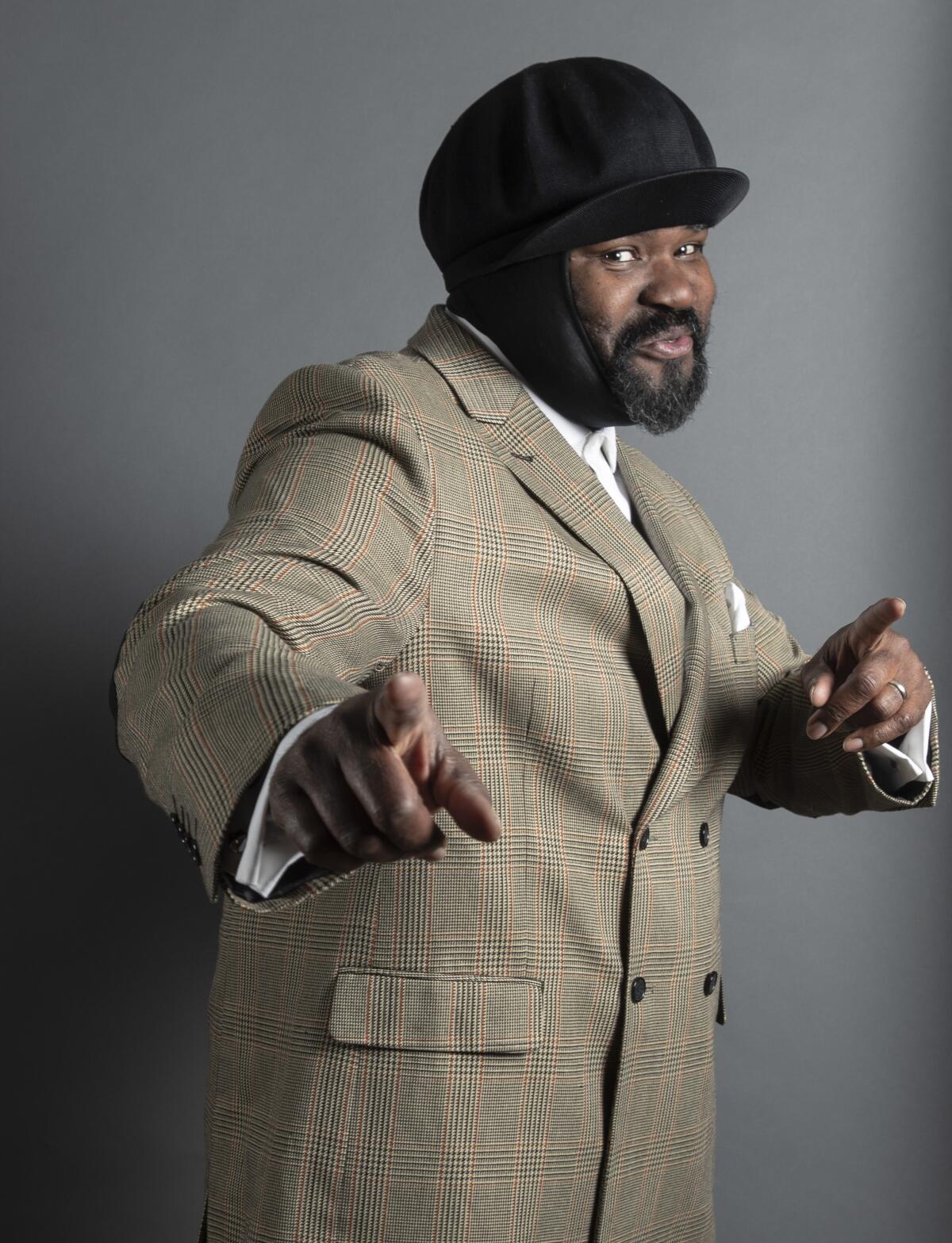
The power of love
The power of love permeates all six of Porter’s studio albums, from his often sublime 2010 debut, “Water,” to the new “All Rise,” whose title suggests both religious ascension and courtroom proceedings. Accordingly, his songs of hope and uplift periodically address timely issues in a world increasingly fraught with tension and peril.
Witness the understated yet expertly executed social and political commentary on such superb, Porter-penned songs as “When Love Was King” and “1960 What?” And witness this year’s “Mister Holland,” which was inspired by the hate-filled father of a girl Porter hoped to date when he was 17. The real Mr. Holland used a racial epithet and explicitly told Porter to get away from the family’s door, then threatened bodily harm if the young man ever tried to see his daughter again.
Rather than give in to anger, Porter crafted the lyrics of the buoyant “Mister Holland” with admirable subtlety and sophistication. The song includes such deceivingly upbeat couplets as: By the way, Mister Holland / I like the way you make no trouble of my skin / It’s not a problem / Nor has it ever been / You invited me into your home / Treated me like I was grown ...
“I have used music many times in my life to put people at ease, to pacify,” Porter noted. “When I say ‘people,’ I mean White people who saw me as a threat. So this is a way to speak of that conversation that many Black people have, that conversation your parents have with you when you are about go out the door.
“My mom feared for me. She said: ‘You go out in the world and people will fear you.’ The song ‘Mister Holland’ refers to when your parents tell you: ‘Be careful. Be wise about what you say and do, because I want you to come home in one piece.’
“It seems to me what I’m doing with my songs, if I look back at my career, is about love and subtle protests. I speak about many of the conditions of Black life, be it to fan the flames and raise your fists in the air, but also to be sweet. That’s an homage to nonviolent protest, which is so, so important now.”
The lessons imparted to Porter by his mother gave root to his resiliency. His music provides a wonderfully vital and visceral outlet for those lessons to be shared.
When he addresses his absent father on “Dad Gone Thing,” a standout song on his new album, Porter tempers the disappointment and bitterness of his lyrics with his wonderfully supple and engaging baritone vocals.
On “Revival Song,” a gospel-fueled ode to Freddie Gray — a 25-year-old Black man who died while in police custody in Baltimore in 2015 — Porter attracts listeners with a snappy beat and a deceptively uplifting vibe that belie the song’s tragic inspiration. And on the slow-building, Brazilian-flavored “Merchants of Paradise,” he juxtaposes lyrics that decry religious and political charlatans with warm, inviting music and smooth-as-molasses singing that finds the perfect sweet spot between Johnny Hartman and Marvin Gaye.
“The process of writing these enlightening and inspiring songs is also healing for Gregory,” said UC San Diego music professor Kamau Kenyatta, a key Porter mentor and collaborator. He has produced or co-produced five of the singer’s six studio albums. Two of them, “Liquid Spirit” and “Take Me to the Alley,” won the Grammy Award for Best Jazz Vocal Album in 2014 and 2017, respectively.
“At the same time Gregory is expressing himself, he’s taking some of the pain he’s experienced and the process of creating something new is a healing force for him,” Kenyatta continued.
“Then there’s this other component — the records and concerts — that reach society at large. He’s very aware of this; it doesn’t happen by chance. He knows he can take his art and healing powers to the world.”
Porter does exactly that on “All Rise,” which was originally slated to come out in April but was pushed back to Friday because of the coronavirus pandemic.
The 13-song album was produced by former Amy Winehouse and Roy Ayers drummer Troy Miller. The music is given aural depth and breadth by Porter’s longtime band members, a four-piece brass section, a 10-piece choir and the string section of the London Symphony Orchestra.
“I like the performances on my records to be socially engaging,” said Porter, who wears a balaclava and hat to cover facial scars that date back to his elementary school days.
“I’m trying to reach everybody’s ears. When I do that, I also have the opportunity of creating songs — not a Trojan Horse — that get people to talk about serious things in life, which I like to wrap in a very accessible musical package.”
Gentle giant of the gridiron
Standing 6-foot-4 and weighing 225 pounds, Porter moved to San Diego from Bakersfield in early 1990 after earning a full, four-year football scholarship to SDSU as a lineman. He laughingly recalls two of his teammates, running back Marshall Faulk and receiver Merton Harris, asking him to sing on the field.
“They were expecting me to do an R&B number,” Porter said. “Instead I sang James Moody’s (1949 jazz classic) ‘Moody’s Mood For Love,’ and it blew their minds! They were like: ‘Wow. What is that?’ ”
Three months after he joined the Aztecs, Porter irreparably tore his right rotator cuff during a team practice. Understandably devastated, the urban-planning major thought his life had been irrevocably derailed.
In reality, it was just getting started, thanks to the musical mentoring the deep-voiced singer subsequently received from Kenyatta, fellow UC San Diego music professor George Lewis and two key San Diego jazz patriarchs, trumpeter Gilbert Castellanos and saxophonist/pianist Daniel Jackson.
“Sometimes, when you’re 18, you don’t even know what your passion is,” Porter said.
“I was an athlete and loved to play sports, and I found out that what I really loved was music. ... But there was no way I could tell my mom, who had cancer at the time: ‘Yeah, mom, I want to do this music thing and see how it works out.’ So I told her urban planning is what I’ll do — and that I should find some city or county job somewhere. That’s what I wanted to take to her in her last days of life. And she said to me: ‘Don’t forget about music! Consider music.’ ”
Grieving her death, Porter did not sing for nearly a year. But, buoyed by her encouragement, he eventually began attending weekly jazz jam sessions in San Diego, many of them led by Castellanos. Porter was befriended at one of those sessions by Lewis, now the Edwin H. Case Professor of American Music at Columbia University. Then he met Kenyatta, with whom the budding singer forged an enduring friendship.
“The impact of coming to San Diego was enormous,” Porter said. “Bakersfield had a small-town vibe, a small-town mentality and a small-town culture. SDSU is huge and there’s nothing ‘small-town’ about it. There are people from all over the world there and that was eye-opening and wonderful.”
After his football injury, Porter immersed himself in the jazz records available for listening at SDSU’s Love Library. Ironically, he was rebuffed when he tried to join the school’s jazz ensemble.
“Music was my minor, but the ensemble said they didn’t have a need for a vocalist,” Porter recalled. “So I was trying to get in wherever I could in the local scene. Particularly after I’d left SDSU, I’d go to the nightly jam sessions Gilbert Castellanos led and workshops that George Lewis had at UCSD.
“Daniel Jackson was very important and helpful to me, and so was (saxophonist) Hollis Gentry. They gave me records to listen to and music to learn, and so did Gilbert. Most important, Kamau Kenyatta, my buddy and mentor, hipped me to a lot of things.”
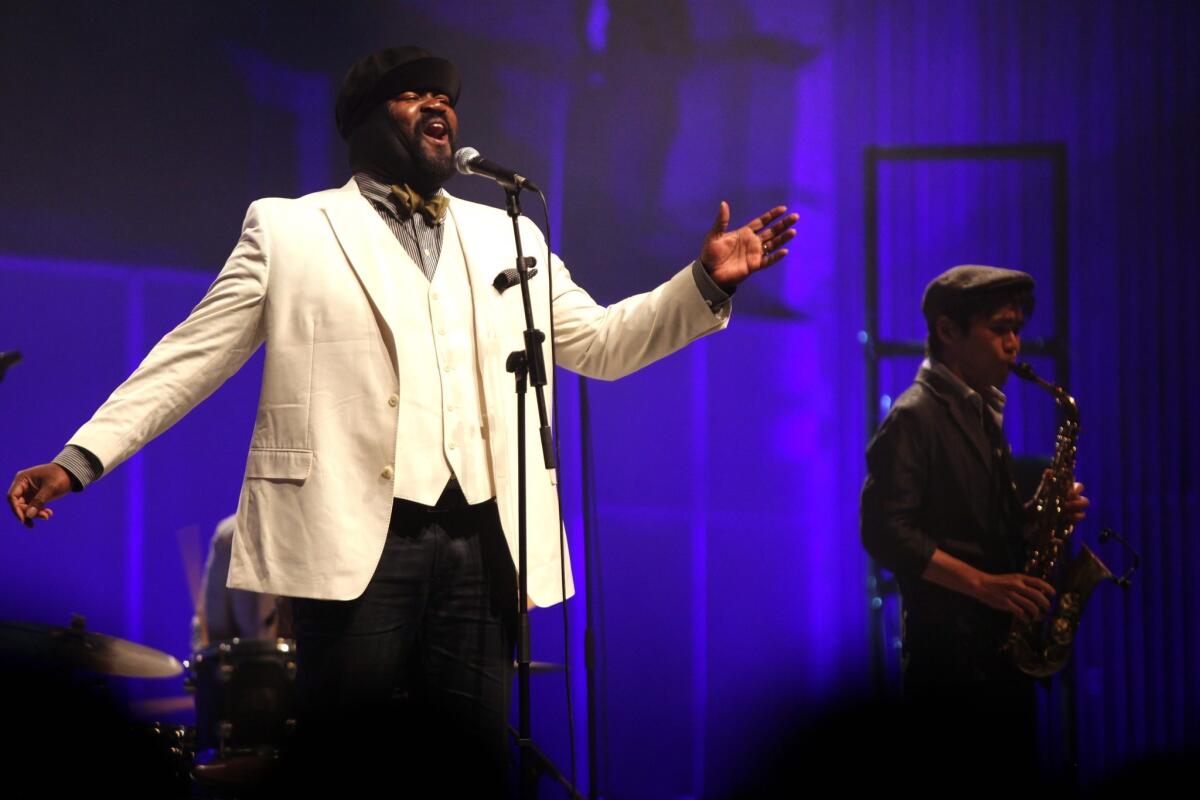
Cooking on stage and off
Porter soon began performing solo gigs in local restaurants and bars, where he accompanied himself on an electric keyboard, and he sang with such local funk-jazz bands as 100% Groove and Zbonics. He later worked in La Jolla as a chef at the Chopra Center, where he learned to make vegetarian Indian dishes before launching his own catering service.
After moving in the late 1990s to New York, he co-starred in the Tony Award-winning musical “It Ain’t Nothin’ But The Blues,” which he first was featured in at the San Diego Repertory Theatre. While establishing himself as a jazz-and-beyond singer in the Big Apple, Porter worked as a chef until his music career took over.
“Oh, man! Gregory’s a fantastic chef,” UCSD music professor Kenyatta said. “I miss seeing him every day, and I miss his cooking for sure. He enjoys doing it. And while he has the ability to prepare multi-course gourmet meals, he can also make something great out of whatever is in the refrigerator.”
Porter, who counts curried salmon with mango chutney as one of specialties, modestly allows he has “good knife skills” in the kitchen. He responded enthusiastically when asked if making good music and making good food overlap for him.
“Very much so,” said the singer, who has appeared as a guest on various cooking shows in Europe, where his career first ignited. “The discipline of cooking, mixing ingredients and tasting with your hands before you can actually put it in your mouth, is what I absolutely feel when I’m creating music in my head.
“People who don’t write music all the time think it’s created on paper, but it’s created in the head and the heart first. When you put minced garlic, olive oil, salt and red pepper in a pan, you know what it will taste like. It’s the same with music. You put rhythms and bass lines together with harmony and melody in your brain first, and you know what it will sound like. Improvisation can change the flavor and direction of food and music. In both cases, you hope you can elevate it away from ego.
“The two go together in so many ways for me. In terms of culture, if I can speak specifically of Black culture and how putting soothing plates of food in front of a loved one is a gift, an offering, it might bring pleasure and culture at the same time. It’s the same with music.”
Get U-T Arts & Culture on Thursdays
A San Diego insider’s look at what talented artists are bringing to the stage, screen, galleries and more.
You may occasionally receive promotional content from the San Diego Union-Tribune.

